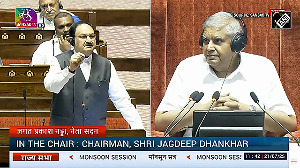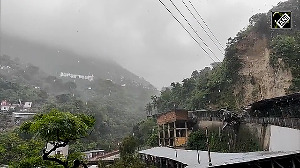It has now clearly emerged that the directive to delink Pakistan's response -- to bringing the perpetrators of the Mumbai terror attacks to justice and to take tangible measures to end terrorism against India by Pakistan-based Jihadi organisations -- from the composite dialogue process came from Prime Minister Manmohan Singh himself at Sharm el-Sheikh.
Also, the mention of Balochistan in the Joint Statement of July 16 has further raised the political temperature in the country and given the Opposition one more excuse to stall the proceedings in Parliament. Opposition leaders used phrases like 'sellout' and 'capitulation' to describe the twin gaffes.
The government's spin doctors have gone into overdrive to explain the diplomatic faux pas. External Affairs Minister S M Krishna said India wanted to give the Pakistan government a 'chance to prove or disprove' that they are in control of the machinery. Minister of State for External Affairs Shashi Tharoor rather disingenuously tried to reduce the fallout of the gaffe by claiming that the Joint Statement is merely a diplomatic paper that has no legal sanctity.
Foreign Secretary Shiv Shankar Menon candidly admitted that the Joint Statement was 'badly drafted'. Other functionaries have said the only subject that will be discussed, when the two foreign secretaries meet, will be terrorism and that the government has not agreed to resume the composite dialogue process.
After some initial dithering, the Congress leadership has come out strongly in support of Dr Singh's stand that India cannot afford to take a position where it refuses to talk to Pakistan. The prime minister's expected statement in Parliament on July 29 should clear the air on the various contradictory postures.
However, whatever the prime minister might say in defence of his grand vision to seek peace with Pakistan, he cannot justify the oblique insinuation in the Joint Statement that India has a hand in what Pakistan calls 'threats in Balochistan'. This reference draws a parallel with Pakistan's prolonged proxy war in Jammu and Kashmir, under the shadow of its nuclear umbrella, and cannot be justified even though "India has nothing to hide".
Pakistan has for long accused India of supporting the insurgency in Balochistan. More recently, it has begun to accuse India of sponsoring Taliban terrorism in the North West Frontier Province from its consulates in Kandahar and Jalalabad in Afghanistan. Given the high political and military stakes that the United States has in its global war on terror in the Af-Pak region, it would have come down hard on India if it had even an iota of suspicion that India is engaged in nefarious activities in the NWFP and Balochistan. On the contrary, Admiral Mike Mullen, Chairman, US Joint Chiefs of Staff, has publicly called on Pakistan's Inter Services Intelligence to change its 'strategic thrust which has been to foment chaotic activity in the countries bordering Pakistan'.
In fact, Indian workers and even the Indian embassy in Kabul have been targeted, the latter with Pakistan's army chief General Ashfaq Pervez Kayani's personal approval, and India has looked on with helpless rage. It is also a moot point whether the virulent fundamentalists who comprise Baitullah Mehsud's Tehrik Taleban Pakistan and Maulana Fazlullah's Tehreek-e-Nafaz-e-Shariat-e-Mohammadi would deign to accept Indian help even if it was offered.
It must not be forgotten that soon after the Mumbai terror attacks, when talk of war was in the air, Mehsud's TTP had offered to send thousands of Taliban fighters to fight alongside the Pakistan army.
Pakistan's mounting energy insecurity, which is marked by rapid growth in demand combined with increasing scarcity in a region with intensified energy rivalry, has magnified the economic and strategic importance of Balochistan. The separatist resurgence is thwarting Pakistan's plans to optimally utilise Balochistan's energy reserves. It is also hampering efforts to build trans-national gas pipelines from Iran and Turkmenistan and efforts aimed at fully exploiting the rich potential of the Chinese built port at Gwadar, including providing a land route for the transportation of goods to China's Xingjian province.
For over six decades, Pakistan has extensively mined the rich mineral resources of Balochistan. This is deeply resented by the people of Balochsitan as the government of Pakistan does not give them what they consider their due share of the revenues generated from the mines. Balochistan continues to remain the least developed province of Pakistan and poverty is rampant.
While India has had traditional linkages with the Baloch people and most Indians sympathise with their plight, India does not materially support the Baloch uprising, which has been brutally crushed by the Pakistan army. Hence, on both counts -- Indian support for the Taliban terrorists and for the Balochistan Liberation Army -- India must treat the dossier provided by Pakistan Prime Minister Yousaf Raza Gilani merely as a negotiating stratagem and nothing more.
President Asif Ali Zardari's government is in no position to deliver on the promises that it makes. There are dissensions within the civilian government as well as major policy differences with the army and the ISI.
Lieutenant General Shuja Pasha, the ISI chief, told the Indian army, navy and air force's defence advisors in Islamabad on July 3 that the ISI and the Pakistan army should find a place in the talks with India as they play a 'key role in helping the foreign ministry (to) formulate its policies'. Also, among the key players in Pakistan are the heads of various Jihadi outfits such as the Lashkar-e-Tayiba, Jamaat ud-Dawaa, Jaish-e-Mohammed and Harkat-ul-Jihad-al Islami, which have formed a loose confederation with the Taliban, Al Qaeda and other radical extremist organisations that comprise the International Islamic front.
The best option to deal with the post-Sharm el-Sheikh politico-diplomatic crisis would be for Parliament to send a clear message that terrorism directed against India and emanating from Pakistani soil must be brought to a demonstrable end and that the government of Pakistan must show the resolve necessary to bring to justice the perpetrators of the Mumbai terror attacks. This can be done through a Sense of the House resolution in the Lok Sabha. Such a resolution will demonstrate that when it comes to vital national interests, the people's representatives can sink their differences and stand together. It is time India spoke in one voice on a matter of national importance.
Gurmeet Kanwal is Director, Centre for Land Warfare Studies, New Delhi






